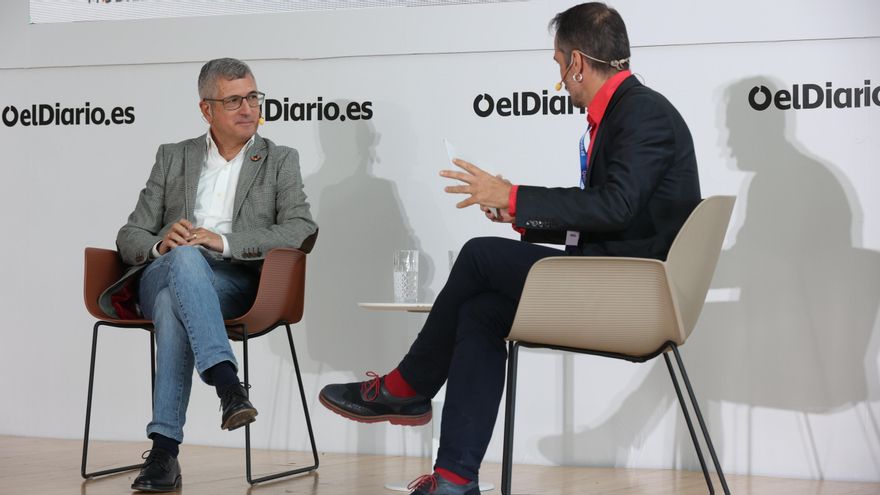The Secretary of State for the Environment, Hugo Morán, described this Monday the controversy over the garbage rate that some municipalities have begun to charge this year as “artificial” and has defended that “it is not something new.” After the Madrid mayor, José Luis Martínez Almeida, has criticized the rate and called it a “big lie” by the Government, Morán has pointed out that “in one way or another” all councils “historically manage their waste” and, in those cases in which there was no rate, “it was being paid with other means of collection, in most cases through the IBI.”
The Secretary of State expressed himself in this way in an interview within the framework of the IV Conference on Circular Economy and Renewable Energies organized by elDiario.es, in which he pointed out that this way of collecting, “moves in an area of opacity that says very little about the idea of using this tool to reduce” garbage. “In this way, the neighbor is paying what it costs to manage his waste but he does not know it because no one has told him. He does not know if he is paying what it costs, more or less, but he is paying it,” added Morán before pointing out that the Madrid council “was already charging what it costs for waste management before”, but “another thing is that no one knows.”
The rate, which requires charging the real cost of the service, is based on the principle “who pollutes pays and who pollutes more, pays more” because environmental taxes “do not have a collection philosophy, but rather a deterrent one,” responded the Secretary of State of the Ministry for the Ecological Transition and the Demographic Challenge to the questions of the head of the Society Section of elDiario.es, Raúl Rejón, who conducted the interview.
In this sense, the number two of the department, directed by Sara Aagesen, has called on city councils to “be fair when distributing the rate” because “if it is well used, residents must realize that those who produce less waste pay less.” In addition, he has demanded that the councils “stop collecting” the amount “where it was being collected before”, which used to be “a municipal tax.”
The “return of the helmet”
The Secretary of State for the Environment has also referred to the can and bottle return system that Spain must implement soon and has announced that there is already “very advanced work” on the table so that “in a reasonable period of time” it can be implemented due to non-compliance with recycling objectives. The model, the classic “return the helmet”, involves increasing the price of the product, money that will be returned if the packaging is returned, which entails “a great cultural change” in the way consumers behave, he maintained.

For this reason, Morán has explained that the Government rules out doing so suddenly. “Changing a model overnight is not easy because you have to convince millions of people that their way of managing waste at home is going to change.” In this sense, the ministry created a working group months ago in which producers, conservation organizations and consumers are represented to design a model that responds “to the broadest possible consensus.”
However, the secretary has explained that the Spanish system must adapt to the “peculiarities” of Spain as a “tourism power.” “When you go on vacation you do not act exactly the same as when you are at home, where you know where the containers are and you have the separation process well designed. If you are a tourist from outside Spain and you come here, you need to have a minimum guide of behavior and good practices,” he said, referring to the challenge that this system can pose in a country that this year “will probably receive 100 million tourists.”
Asked about the Spanish circular economy strategy 'Circular Spain 2030', which promotes several measures in this area, the Secretary of State for the Environment assessed that “if it had been implemented three generations ago we would not have had any difficulty in assuming it” because society “comes from a circular economy model in which nothing was wasted.” Morán has defended transcending the “throwaway” model and has rejected that this “is the only way to develop.” “We have assumed that the more consumption, the higher the quality of life” and “that this is not the case implies recognizing that we have made a mistake or have been deceived.”
However, the number two of the Ministry for the Ecological Transition and the Demographic Challenge has defended that now citizens “are in a position to assume that the fight against pollution and a pattern of life linked to the circular economy is much more profitable in terms of health and economics”, an awareness that, he has pointed out, “is greater” since October 29 of last year, anniversary of the dana disaster in the Valencian Community and the wave of fires in the last August.